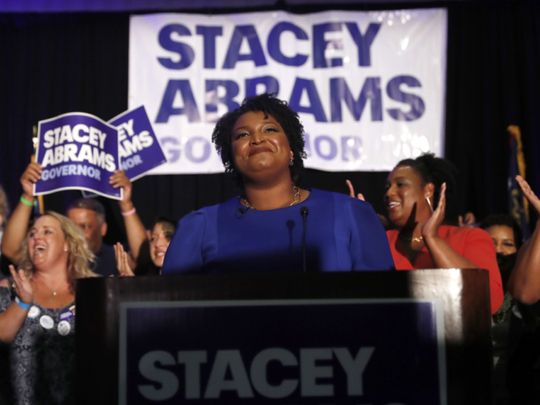
Atlanta: Georgia Democrats selected the first black woman to be a major party nominee for governor in the United States on Tuesday, choosing Stacey Abrams, a liberal former state House leader, who will test just how much the state’s traditionally conservative politics are shifting.
By defeating Stacey Evans, also a former state legislator, Abrams also became Georgia’s first black nominee for governor, a prize that has eluded earlier generations of African-American candidates in the state. The general election is sure to draw intense national attention as Georgia voters determine whether a black woman can win in the Deep South, a region that has not had an African-American governor since Reconstruction.
She will face either Lt. Gov. Casey Cagle, the top Republican vote-getter Tuesday, or Secretary of State Brian Kemp. Cagle and Kemp will vie for their party’s nomination in a July run-off.
Abrams’ victory, confirmed by The Associated Press, came on the latest 2018 primary night to see Democratic women finding success, as voters in Kentucky, Arkansas and Texas also went to the polls. Among the winners was Amy McGrath, a former Marine fighter pilot, who upset Lexington Mayor Jim Gray in a House primary in Kentucky.
But it was the breakthrough of Abrams that drew the most notice. A 44-year-old Yale Law School graduate who has mixed a municipal career in Atlanta and statehouse politics with running a small business and writing a series of romance novels under a nom de plume, she is now a central character in the midterm elections and the Democratic Party’s quest to define itself.
In a Facebook post declaring victory Tuesday night, Abrams acknowledged the general election would be tough and cast herself as the candidate representing “the Georgia of tomorrow”.
New chapter
Speaking later to a throng of supporters at a downtown Atlanta hotel, Abrams did not directly invoke her barrier-breaking nomination but held up her candidacy as a sign of the state’s progress.
“We are writing the next chapter of Georgia’s history where no one is unseen, no one is unheard, and no one is uninspired,” she said.
When she arrived, Abrams spoke forcefully, calling herself a “proud daughter of the Deep South” and referring to Georgia’s rich but “complicated” history — and of leaders who too often had overlooked the “gap between struggle and success.”
She also quoted the Book of Esther, saying “We were born for such a time as this.”
With Atlanta thriving as a capital of black America and a magnet for immigrants across the world, Georgia’s demographics are changing. Yet even as Democrats eye the state as the next great blue hope, the party has struggled to win statewide office in part because it has had little success with conservative-leaning whites. African-American Democrats have held powerful state offices, like the attorney general’s post, but Republicans currently control every major position in Georgia.
Abrams has signalled that she is unlikely to spend much time pleading with rural whites to return to a Democratic Party that they have largely abandoned. She has embarked instead on a strategy of energising a coalition of young and nonwhite Georgians who represent a growing share of the state’s population, an approach national Democrats are watching closely as they grapple with how to reclaim the presidency.
But this slice of the electorate has not proven to be reliable in nonpresidential races and some of them are not registered to vote at all. By contrast, non-Hispanic white voters make up about 53 per cent of Georgia’s population, according to census data, and they tend to vote in strong numbers.
And Abrams’ race and gender may make her bid difficult enough: Georgia has never elected a female governor and, while Atlanta has elected a procession of African-American mayors, they have not found success in running for statewide office.
Volatile moment
Yet Abrams’ candidacy comes at a volatile moment in Georgia, where demographic changes are creating fresh uncertainty about Republicans’ dominance, and when left-leaning voters are highly energised.
President Donald Trump carried Georgia by just 5 percentage points in 2016, a narrower margin than he enjoyed in traditional battleground states like Ohio and Iowa. And booming communities of black, Hispanic and Asian-American voters in the Atlanta area have put Georgia on track to become a majority-minority state inside of a decade.
Her candidacy will also be a test of whether the extraordinary energy coursing through Democratic politics at the federal level will also flow into state elections. In a special election for Congress in Georgia last year, grass-roots donors helped a political newcomer, Jon Ossoff, raise nearly $30 million in a losing campaign. But there is little precedent for Democrats pouring small dollars into a state election on that scale, and it is unclear whether Abrams can expect a similar outpouring of support.
Recognising that opportunity, and facing growing calls for candidate diversity in a party that depends heavily on black voters, several national groups aligned with Democrats have made Abrams’ campaign a top priority. And African-American activists say they will be watching them to ensure they keep their commitment.
“We need to hold our institutions accountable to investing in black women’s leadership,” said Glynda Carr, who helped found Higher Heights, a group that promotes African-American women in politics.
In other primary races Tuesday, Kentucky’s McGrath displayed another show of force by a Democratic woman in a contested primary. She seized the party’s nomination for a Republican-leaning House seat based in Lexington, defeating Gray, the city’s popular mayor.
National Democrats had aggressively recruited Gray to challenge the incumbent there, Rep. Andy Barr, viewing Gray’s stature as a local official and former Senate candidate as assets in the race. But McGrath had a different and plainly more powerful appeal as a political newcomer, and she entered the race with a splashy online video that dramatised her military career and electrified Democratic activists in Kentucky and beyond.
In Texas, Lizzie Pannill Fletcher, a lawyer, defeated Laura Moser, a writer and political progressive, in a Houston-area House run-off that once was seen as a major proxy fight between the Democratic establishment and its left wing.
Liberal challengers
But after attacking Moser during the first round of balloting in March — a move that seemed to elevate her candidacy by accident — the House Democratic campaign arm remained silent while still quietly backing Fletcher. Moser was then unable to rouse some of the liberal attention she drew in the lead-up to the initial vote.
Elsewhere in Texas, Gina Ortiz Jones, an Air Force veteran, won the nomination to run in a heavily Hispanic district that stretches from San Antonio far along the state’s southern border. Jones, who would be the first lesbian to represent Texas in Congress, will face Rep. Will Hurd, a Republican who has won a series of difficult elections.
And in a Democratic run-off in the race for governor, Lupe Valdez, the former Dallas County sheriff, defeated Andrew White and will face the Republican incumbent, Greg Abbott, in the fall.
The most prominent race in Arkansas on Tuesday was in the state’s most moderate House district, a Little Rock-based seat that sent Democrats to Congress until 2010. Clarke Tucker, a state representative, defeated a handful of more liberal challengers to win the nomination, avoiding a run-off. He will take on Rep. French Hill in November.
In the Republican primary for governor, Asa Hutchinson held off an aggressive conservative challenge from Jan Morgan, a television personality and gun shop owner. Hutchinson will face Jared Henderson, the Democratic nominee.












